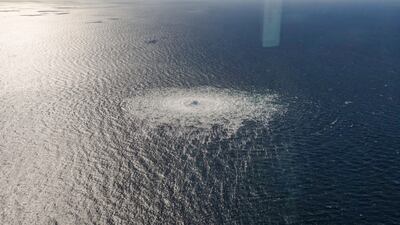European powers on Wednesday vowed to get to get to the bottom of the mysterious leaks on Baltic Sea gas pipelines that prompted suspicions of Russian sabotage.
Josep Borrell, the European Union’s top diplomat, said all available information suggested a “deliberate act” had caused the leaks from the Russian-owned Nord Stream 1 and Nord Stream 2 pipelines.
Swedish prosecutors began inquiries into the leaks as a rescue ship patrolled the bubbling plumes on the Baltic surface. Denmark said explosions were to blame, while Nato spoke of an act of sabotage.
Russia on Wednesday denied involvement, amid speculation that the blast was a warning from Moscow that it could tamper further with European energy supplies.
It intended to call a UN Security Council meeting over damage to the pipelines, Foreign Ministry spokeswoman Maria Zakharova said on Wednesday.
Danish authorities said it could be one or two weeks before the waters calm sufficiently to investigate what happened below the surface. Sweden's coastguard offered divers and underwater craft to aid the inquiry.
"It is a very large blast that has taken place, therefore it will take time before we can get down there," Danish Defence Minister Morten Bodskov said.
Scientists in Denmark, Sweden and Germany said two tremors were picked up on seismographs in the area where the leaks were discovered, adding to suspicions of a man-made blast.
The Danish geological survey said the tremors "do not resemble signals from earthquakes ... they do resemble the signals typically recorded from blasts".
Norway, now the biggest gas supplier to Europe instead of Russia, said it would increase security around its terminals and drilling platforms. It came after reports of increased drone activity on Norway's continental shelf.
Norway said there was much to indicate sabotage on Nord Stream 1 and 2, while Germany said there was nothing to suggest a natural cause.
The Kremlin hit back at suggestions of Russian involvement by describing them as "predictable and predictably stupid".
"This is a big problem for us," Kremlin spokesman Dmitry Peskov said. "The entire system is ready to pump gas and the gas is very expensive. Now the gas is flying off into the air."
Helicopters and navy vessels patrolled the turbulent waters where three separate leaks were detected along the route of the pipelines, which pass through Swedish and Danish waters on their way from Russia to Germany.
Although there is no immediate loss of gas supply to Europe because the pipelines were already at a standstill, the leaks raised environmental and security concerns and were described as an attack on critical infrastructure.
“These incidents are not a coincidence and affect us all,” Mr Borrell said.
“Any deliberate disruption of European energy infrastructure is utterly unacceptable and will be met with a robust and united response.”
Nato too said it saw the leaks as an act of sabotage. It said it was discussing the protection of key infrastructure in Denmark and was holding talks with prospective Nato member Sweden.
Ships were told to avoid the boiling seas where gas was leaking, for fear the fuel would ignite or that vessels would lose buoyancy. Sweden told aircraft to steer clear of the source of the leaks.
There were also concerns about the environmental impact of the escaped natural gas, which consists primarily of methane - a greenhouse gas many times more potent than CO2.
"It would have a very large environmental and climate impact indeed, even if it released a fraction" of the gas in the pipes, said Dr Paul Balcombe, a chemical engineer from Imperial College London.

Many politicians suggested Russian involvement, saying Kremlin agents might have sought to spook markets and cause concern in western Europe about energy supplies this winter.
"It is likely that Russia is trying on the one hand to sow unease in the European population, and on the other hand to signal on a state level the threat of an attack on critical infrastructure," German MP and former army officer Roderich Kiesewetter told public radio.
Charles Michel, the president of the European Council, said the apparent attacks "appear to be an attempt to further destabilise energy supply to the EU", but did not name any potential aggressor.
Some politicians thought the timing was significant, just as Poland opened a new energy link with Norway and Denmark, interpreting an attack on Nord Stream as a threat to do the same to other pipelines.
A former Polish foreign minister, Radek Sikorski, offered an alternative theory by hinting at a possible American operation against a pipeline route that Washington has always viewed with suspicion. The US described the gas leaks as apparent sabotage.
Nord Stream 1 has been out of action for weeks because of what Russia says are technical problems but Germany describes as spurious excuses to squeeze Europe’s supplies.
The parallel Nord Stream 2 was completed last year but had yet to start delivering gas before German Chancellor Olaf Scholz suspended the project in February, days before Russia invaded Ukraine.
Russia more recently dangled the possibility of opening Nord Stream 2 if Europe has a change of heart, a course of action supported by a minority of German politicians.


